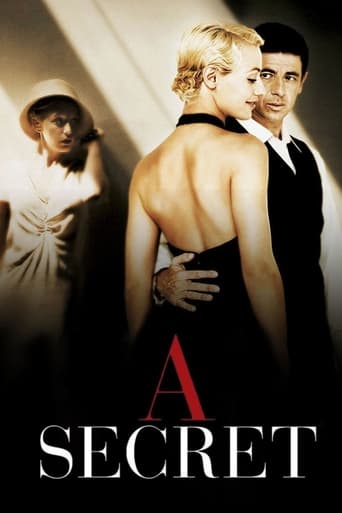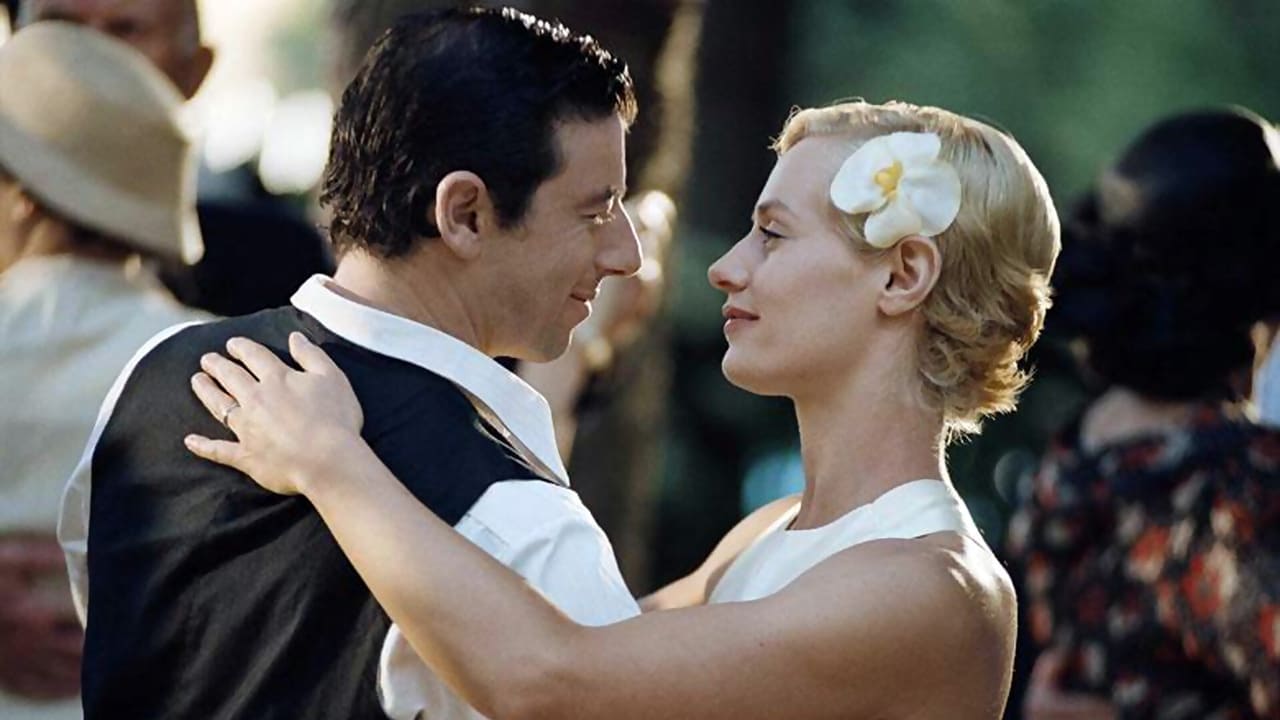gg-742-688109
The heart of the story is fatally flawed by an idiotic premise which negates an otherwise decent movie. We are told a mother betrays her son to the Nazis -- an act of lunacy or depravity which is not explained or supported by the rest of the movie.The movie is presented as a series of flashbacks. These flashbacks jump back and forth among several different time periods; they seem more like gimmicks than useful tools for telling the story. A flashback to one previous time should have been enough to show the family secret.Watching this movie leaves one with the feeling that the director and writer are obtuse or that they think the audience are.
freebird-64
I was able to see to see this film as part of a recent festival of French films shown at Cannes. It was one of the better French movies that I've seen but somehow it lacks the emotional impact to make it a truly outstanding film.Un Secret is about Francois, who gradually learns about his family's secret history, dating back to World War II, that continues to haunt his parents and himself even up to the present. The director expresses this idea visually by shooting the present day scenes in black and white and the flashback scenes in color.The plot of Un Secret is well-laid out and comes together satisfyingly enough. I have to admit that one problem I had with the film was that I had some problems following the complicated family relationships among the characters, but once you get past that, the way the story unfolds is ultimately rewarding.The problem I had with the film, which may just be my problem, is that the film lacks emotional impact. The film'e emotions are understated and, while this is not necessarily a bad thing, prevents it from becoming truly memorable.Still, its one of the better recent French films and you should see it if you get the chance.
antcol8
What's the difference between a film and a movie? Or is there one? Well, some works are definitely both...Hitchcock, Sirk...but, what's my point? Oh, yeah...this is a MOVIE. Like, well maybe I've seen too much Ozu or something, but I think ONE glance from Patrick towards Cecile ON HIS WEDDING DAY would've really made the point - would've made the point a lot better than it was made. From that moment on, I was in danger of checking out. If I ever see this film again, I promise to count how many times he checks HER out in that one poor sequence. It's at least 20 times - ridiculous.I don't like having my cinephilia insulted in this way. And the Kitsch of it is, from that moment on, we are launched into some kind of weird Freudian/Lacanian scenario where The Return of the Repressed meets The Primal Scene. Every time we see Tania's taut buttocks in that clingy bathing suit that covers her va-va-voom body, every time we are thrown back into that most Portnoy-ish of Selfhating Wet Dreams, where the Blond Shiksa is a Full-Blooded Jewess, we both can't wait for Mommy to die so that we can be together with the Babe, and we hate ourselves for feeling like this. Guilt - yummy! It takes away the feeling of prurience and lays "high seriousness" on top of it - one of the classic Kitsch layer cakes. So why the Seven rating? Because if you leave out the fact that Miller really doesn't trust his viewers to think for themselves, there is something powerful in this film, the way it links Frenchness and Holocaust Denial, the way it shows how Jewishness is such a complex construction which conflates Race, Religion and Culture. But careful which films you quote if you're not on their level: Grand Illusion is name-checked, bits of Night and Fog are shown, and isn't the Bal Musette after the Klezmer Wedding (a really nice musical transition, by the way) shot at the same hall as the the famous Lesbian Dance in The Conformist? It sure looks like it. Pardon My French, but Vive La Difference!
Chris Knipp
This film about a Jewish family that hides some of its most devastating personal Holocaust losses after the end of the Occupation has relative mainstream appeal. As I've noted earlier, Variety predicted "good, but unexciting" prospects for a US release. While the film did relatively well in France considering the high US market share these days, that means it ranked 20th for box office there (according to ScreenDaily.com). A Secret/Un Secret tells the story of a boy named Francois (Valentin Vigourt at 7, Quentin Dubois at 14, Matthieu Amalric as a grown man in the 1980's--who now is a therapist who treats shy, withdrawn boys like himself when young). Growing up in the Fifties, Francois has a mother, Tania Grimbert (Cecile de France) who's beautiful and athletic and a great diver, while he's studious and frail and afraid of the water and of strangers. As a seven-year-old Francois is comforted and (literally) massaged and given vitamin shots by Louise (Julie Depardieu), an old friend of the family. Francois is the despair of his father, Maxime Grimbert (Patrick Bruel), who wants him to do gymnastics and be athletic.Francois, like many kids, has an imaginary playmate and in this case this phantom companion is a kind of superior doppelganger, a brother who is good at sports, lively, cheerful, outgoing: everything he doesn't seem to be.In the framing present-time sequences, in black and white, where Francois is Amalric, he meets with Louise and gets a series of revelations about hidden secrets which in part at least he has perhaps by now long suspected. Events a decade before his birth are unveiled, beginning in the early Thirties and leading up to and beyond the War. Amalric's voice-over narrates introductions to these sequences. He learns that his father Maxime had another wife, Hannah (Ludivine Sagnier), a wan and ultimately gloomy individual (she is always seen without makeup, in an unflattering hairdo, smoking) who yet has a robust baby boy, Simon (Orlando Nicoletti). And Simon is the sprightly little gymnast Maxime wanted.The body of the film is what happens when the War comes and France comes under Nazi occupation. A Secret isn't an extremely complicated story but it is a paradoxical one, with parallels and contrasts that may strain credulity. No doubt its central points are eternally valid: the perversions and horrors of the Holocaust, the need of Jews present in Europe at that time to forget in order to move on. The movie is composed of short scenes that block in personalities, situations, and events schematically. It's particularly heavy-handed in lining up Tania to be Maxime's future mate after Hannah is gone by having him ogling her constantly at all times, when she is married to Robert (Robert Plagnol), who is conveniently taken to Breslau as a soldier early in the war: Maxime is ogling no one but Tania even all during his own wedding. Is this necessary? Hardly, but it does set things up clearly in visual terms, through telegraphic closeups and editing.All this schematic stuff undoubtedly works well with viewers on a conventional level, and the production values are good, the scenes richly worked out. It's fun to watch the Fifties bathing scene, which introduces the young Francois as a fish out of mainstream water. Cecile de France is lovely to look at; I'm sorry I said she looked "stolid" and "overly athletic": she's just grand. And no doubt Maxime's constant cruising of Tania is indeed meant to be one of the things that undermines the wilted Hannah's morale. It's not certain that Tania is ideally cast. Tania/Cecile is meant to be a "liver" and a winner, as Hannah is not. But all this is telegraphed so blatantly--as is the contrast between Francois and Simon. Could it not have been made a little more subtle? Nothing can change the power of the devastating moment when Tania and Simon's doom is sealed. It's horrible, it's manipulative (because necessary to the story but not sufficiently motivated), but it's nonetheless memorable. And everything that follows has an emotionality and warmth that the preceding two thirds of the film lacked. The grown up Francois gets a call and rushes him to his aged father, Maxme, who's sitting desolate on a Paris bench after he's let his dog run free on a walk and it's led to the animal's death. Maxime, Francois narrates in voice-over, has recovered from the loss of Simon and Hannah, but he is left inconsolable by the death of his dog. This is how his survivor guilt reemerges. No wonder Francois later has the inspiration of investigating his past and writing about it while visiting a pet cemetery, with his sister, at the aristocratic country house where his father and Tania and Louise were given refuge during the war.Note: the film is based on a novel by Philippe Grimbert. Some of the French reviews note the difficulty of embodying this powerful work in a film. The reviews are solidly favorable, if few are ecstatic. Once again Miller has done something that's worth watching, but not extraordinary. It's a strong cast, if you accept the workmanlike Gruel in his pivotal role.


 AD
AD



